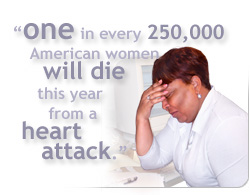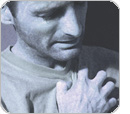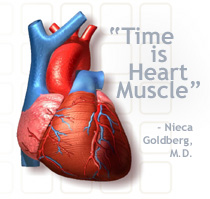
The meeting is finally over. You walk back to your office, exhausted, queasy, anxious. You haven't felt well in weeks.
You didn't sleep much last night, and the rest of the afternoon still lies ahead of you.  You walk to your desk, think of checking your e-mail...and wobble on your feet. You're dizzy. Cold sweat breaks out on your brow. You have trouble catching your breath and wonder if you should tell someone. But you don't. You have an overwhelming need to sit down. You...are...so...tired. Slumping into your chair, you close your eyes and can't imagine getting through the rest of the day. But you must. You take a deep breath, open your eyes, and try to hit the spacebar on your keyboard. You walk to your desk, think of checking your e-mail...and wobble on your feet. You're dizzy. Cold sweat breaks out on your brow. You have trouble catching your breath and wonder if you should tell someone. But you don't. You have an overwhelming need to sit down. You...are...so...tired. Slumping into your chair, you close your eyes and can't imagine getting through the rest of the day. But you must. You take a deep breath, open your eyes, and try to hit the spacebar on your keyboard.
Except...you're having a heart attack. You're now at risk of becoming one of 250,000 American women who will die this year from a heart attack. And, until this moment, you never knew that your heart had this secret to tell. Unfortunately, many women find out too late that they have heart problems, in some measure because heart disease is still regarded as a “man's disease.” Who hasn't seen the traditional, overblown Hollywood image of a sweaty, pudgy, balding guy clutching his chest and crashing to the floor in excruciating pain?  Yet, heart attacks don't discriminate (and they usually aren't as dramatic as movie producers like you to think). The truth is that at some point in their lives, men and women are just as likely to have a heart attack. Put some of the blame on medical research for the misleading notion that heart disease isn't a real problem for women. For a long time, heart studies focused mostly on men. These days, scientists are studying more about women and heart disease, but some doctors still don't recognize the warning signs in their female patients. Yet, heart attacks don't discriminate (and they usually aren't as dramatic as movie producers like you to think). The truth is that at some point in their lives, men and women are just as likely to have a heart attack. Put some of the blame on medical research for the misleading notion that heart disease isn't a real problem for women. For a long time, heart studies focused mostly on men. These days, scientists are studying more about women and heart disease, but some doctors still don't recognize the warning signs in their female patients.
To make matters worse, most women under the age of 55 don't know the signs themselves.
Early SignsIn reality, the warning sings of a heart attack in a woman probably come early and go undiagnosed for weeks, months, or sometimes years before she has a heart attack. "We're finding that, on average, most women experience warning signs four to six months prior to their heart attack," says Jean McSweeney, Ph.D., R.N., a professor at the University of Arkansas for Medical Sciences who lead a study of more than 500 female heart attack survivors. What's more, women and men have significant differences in the symptoms they display. Men typically have the "classic" heart attack signs: tightness in the chest, arm pain, and shortness of breath. A woman's symptoms - nausea, an overwhelming fatigue, and dizziness - are strikingly different. Women may also have trouble sleeping, shortness of breath, and anxiety. Often, these symptoms are dismissed as signs of stress. "Women started telling me how they had a hard time getting physicians to listen to them about these early warning symptoms," says McSweeney. Time is...life It's well-documented that recognizing and treating a heart attack early dramatically improves your chance for survival. The typical American, however, waits two hours before calling for help. "Time is heart muscle," says Nieca Goldberg, M.D., author of Women are Not Small Men: Life-Saving Strategies for Preventing and Healing Heart Disease in Women. "If you get to the hospital during a heart attack, we can administer aggressive clot-busting treatments." Studies have shown that drugs that dissolve blood clots during a heart attack can reduce the death rate in both men and women, although women have a higher risk of stroke from the therapy. Unfortunately, statistics show that a woman having a heart attack typically receives clot-busting therapy much later than a man would. "Women coming into the hospital for a heart attack have a higher death rate and higher risk of complications. A premenopausal woman having a heart attack has twice the death rate of a similarly aged man," says Goldberg. The solution, of course, is acting early. Women need to know the symptoms of a heart attack and call 911 when they feel them. Prevention starts with beliefThere is no denying that an ounce of prevention is worth a pound of cure. On the other hand, to prevent a heart attack you have to believe you are actually at risk -- and many women fail to see that. "Women absolutely need to become more aware of their risk for heart disease," Goldberg says. "Whenever a woman comes to see me after a heart attack, I always ask when they last felt well. Often it was several months, even a year, before the attack."  Your cholesterol levels are important. Low blood levels of "good" cholesterol (high density lipoprotein, or HDL) are a stronger predictor of heart disease death in women than in men. Women with diabetes, kidney disease, and other health problems (such as smoking, high blood pressure, and being overweight) are also at risk. Make sure you also keep track of your family history - you are more likely to have heart disease if your mother or sister does, too. Your cholesterol levels are important. Low blood levels of "good" cholesterol (high density lipoprotein, or HDL) are a stronger predictor of heart disease death in women than in men. Women with diabetes, kidney disease, and other health problems (such as smoking, high blood pressure, and being overweight) are also at risk. Make sure you also keep track of your family history - you are more likely to have heart disease if your mother or sister does, too.
The bottom line is you have to be proactive with your doctor. Talk about your risk factors, and keep close watch on your cholesterol, blood pressure, and lifestyle. Finally, know the symptoms of a heart attack. The sooner you act when you start feeling nausea, overwhelming fatigue, and dizziness, the sooner you can get treatment and survive your heart's big secret.  | David R. Eltz is the managing editor of Synergy and Editorial Director of A.D.A.M., Inc.
David can be reached at featuredstories@adamcorp.com. |
|